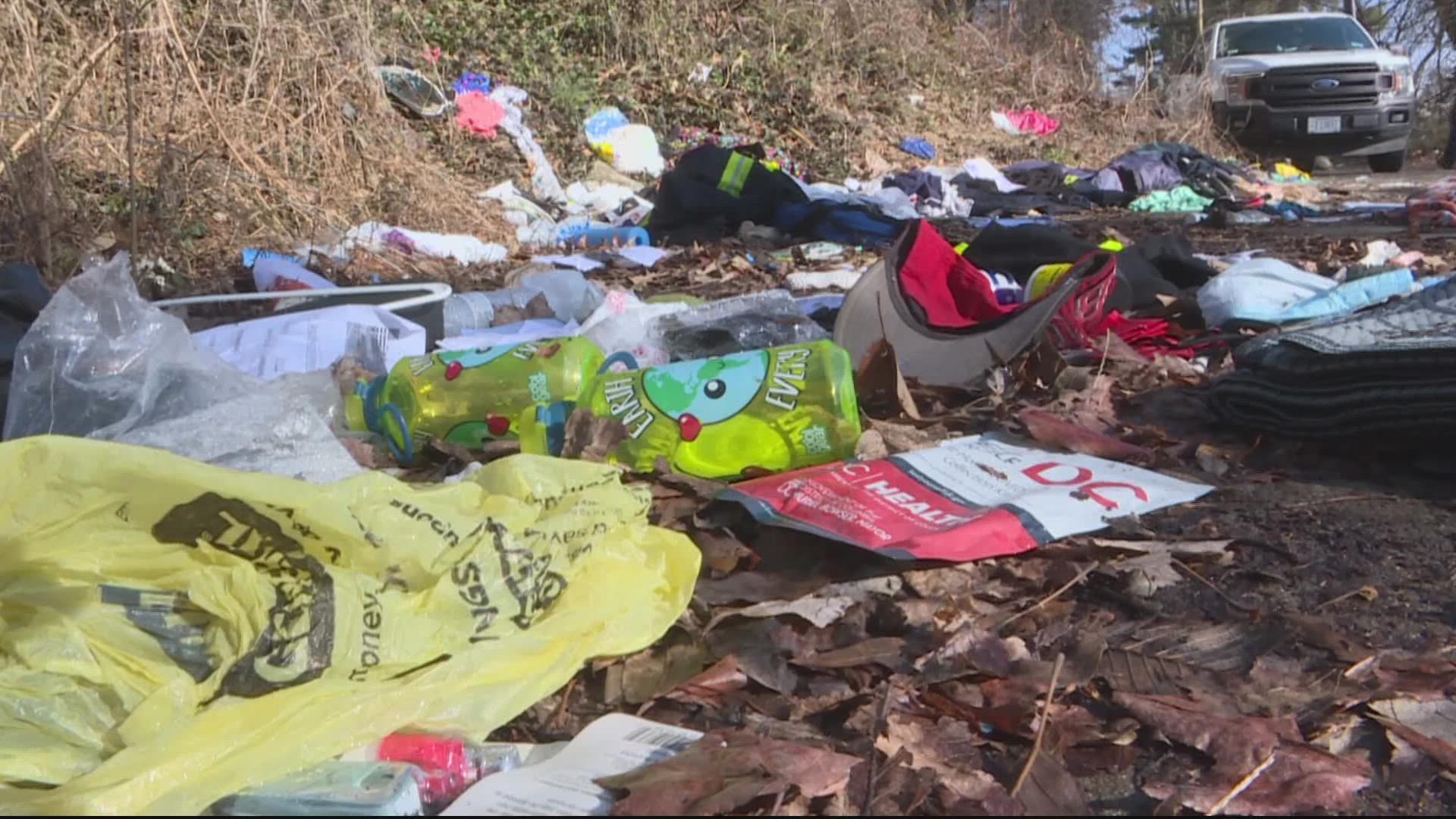WASHINGTON — Illegal dumping is a persistent problem in D.C., and investigators are working to track down the culprits.
Many were shocked to see the hundreds of tires dumped in Anacostia Park in December.
The National Park Service is in charge of that area and cleaned them up last week, but D.C.'s Department of Public Works said on the properties they manage, illegal dumping is a huge issue.
In fact, DPW's Acting Director, Timothy Spriggs, said last fiscal year saw more than 13,000 calls for service related to dumping.
He said so far this fiscal year, they've already received 3,000.
To learn more about how DPW tracks down the people responsible, WUSA 9's Jess Arnold followed around the Environmental Crimes Unit for a morning.
Michael Vanison has served as an investigator with the unit for 20 years.
“I'm also a native Washingtonian, so I do take illegal dumping personal," Vanison said.
Fellow investigator Lisa Duvall is also a native Washingtonian who's been with the unit for 20 years. “I want to make sure that our environment is something that we can pass down to our children," Duvall said.
They said they visit about four sites a day to investigate.
They don't want to reveal specifics about their process to protect their investigative tactics, but they offered an overview of the process.
They said it starts with DPW receiving a service request through 311 or the team discovering a dumping site themselves.
Then, they send the ECU out to investigate.
After developing leads, they'll work with D.C. Police to try to hold dumpers accountable as other crews clean up the areas.
“Sometimes people in the community even have video surveillance equipment, and they provide us evidence," Interim Associate Administrator for the SWEEP team, Susan Burnett said.
SWEEP stands for Solid Waste Education & Enforcement Program. Investigators estimated they solve about 60% of the cases.
"This was clean a week or so ago," Vanison said, pointing to trash at the end of a back road in southeast D.C. "And this is what happens. A lot of times what people will do is they’ll hire someone to haul their stuff away, and they’re not a licensed hauler, and they’ll just dump it anywhere they can to make a quick buck."
If they do something like that, Vanison said they're looking at fines up to $40,000 or even an arrest.
Spriggs said accountability takes a team.“I think it needs to be a unity of effort between the government which is our SWEEP team, as well as our citizens," he said.
The process to clean it all up isn't cheap, either. DPW said it ranges from a few hundred dollars to tens of thousands of dollars for one site.
WUSA 9 asked DPW if the fact that residents who live in apartment buildings with more than three units cannot schedule a bulk pickup through the city contributes to the problem, and this was their response:
"Single family homeowners, including owners of 3 unit buildings, will sometimes knowingly and unknowingly contribute to the dumping of bulk and other items. By law large property owners are required to provide bulk collection services to their residents; it has been our experience that few of the small to medium private property owners have routinely scheduled collection and removal dates."
DPW asks you to report any illegal dumping through 311, so they can track the case from start to finish.
You can also bring the following bigger household items to the Benning Road Bulk Collection site at 3200 Benning Road Northeast Wednesday through Friday (10 a.m. - 2 p.m.):
- Air conditioners (drain water and fluids)
- Hot water heaters
- Household furniture
- Large toys (kiddie pools, playhouses, disassembled swing sets)
- Major appliances, e.g., refrigerators (doors removed)
- Mattresses and box springs (MUST be wrapped in plastic), bed frames
- Rugs (MUST be rolled and tied)
These items are not accepted:
- Books – Place in recycling cart for DPW collection.
- Bricks*
- Ceiling tile*
- Construction Materials*
- Demolition materials*
- Dirt*
- Drywall*
- Electronics and Televisions
- Hazardous and/or liquid waste (list of household hazardous waste items for monthly HHW/E-cycling/Document Shredding drop-off at Benning Rd Transfer Station)
- Household trash or garbage – Place in the trash can for DPW collection.
- Small tree limbs – Tie and place with the regular trash.
- Tree stumps
- Tires -- Up to four tires may be taken to the Benning Road Transfer Station, Wednesday, Thursday, and Friday from 10 a.m. to 2 p.m. ONLY.
You can find more information here.

